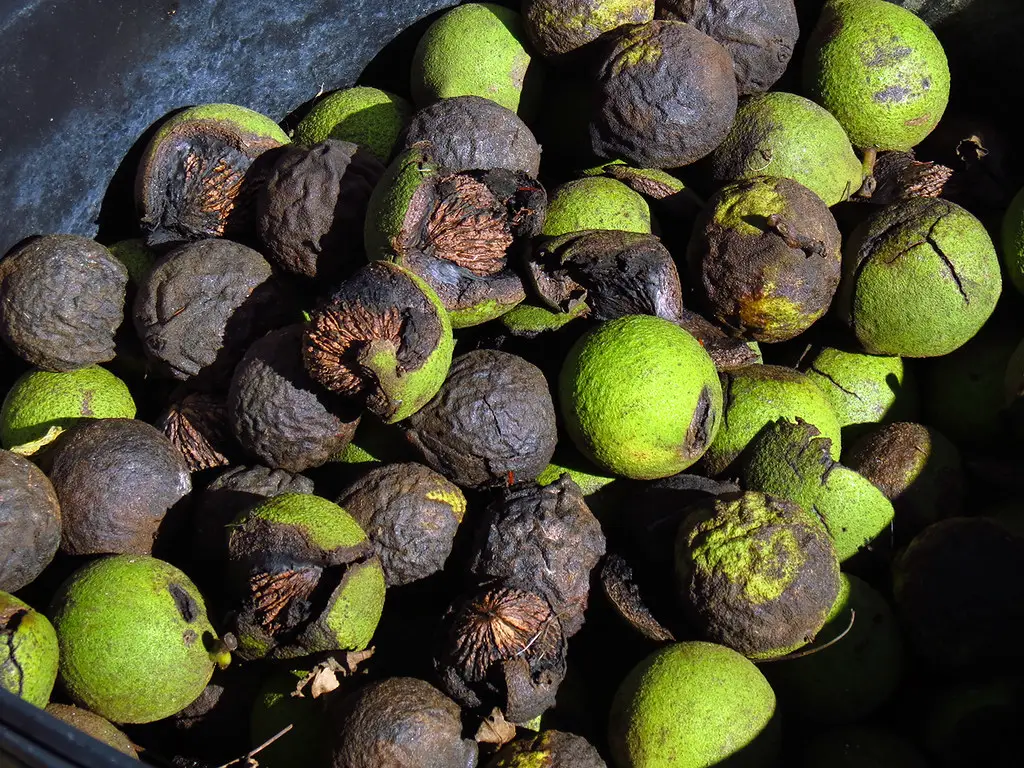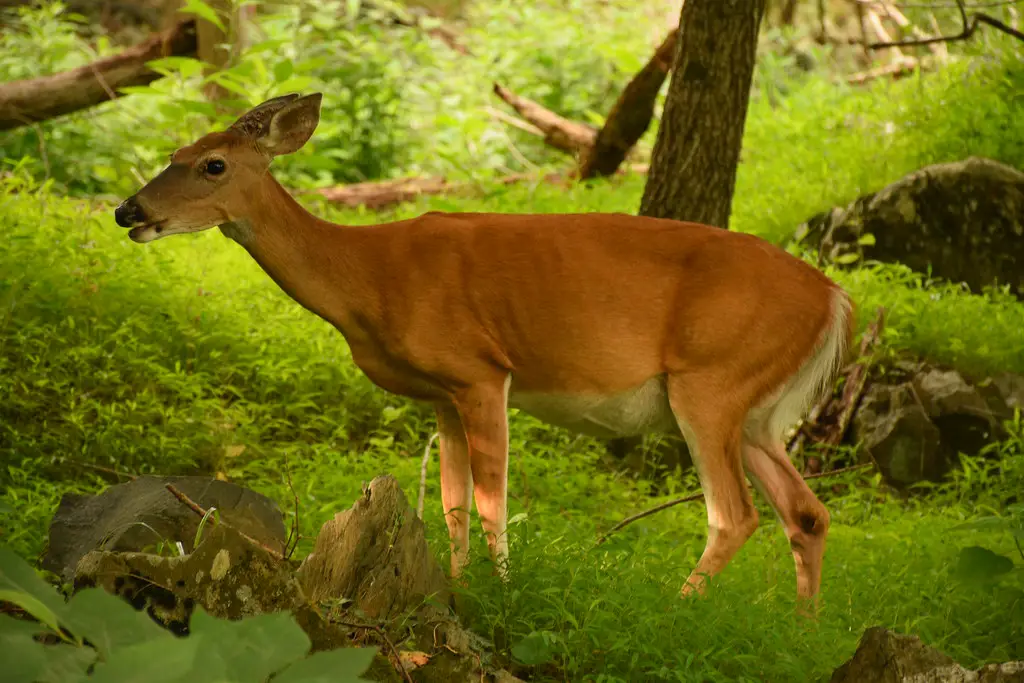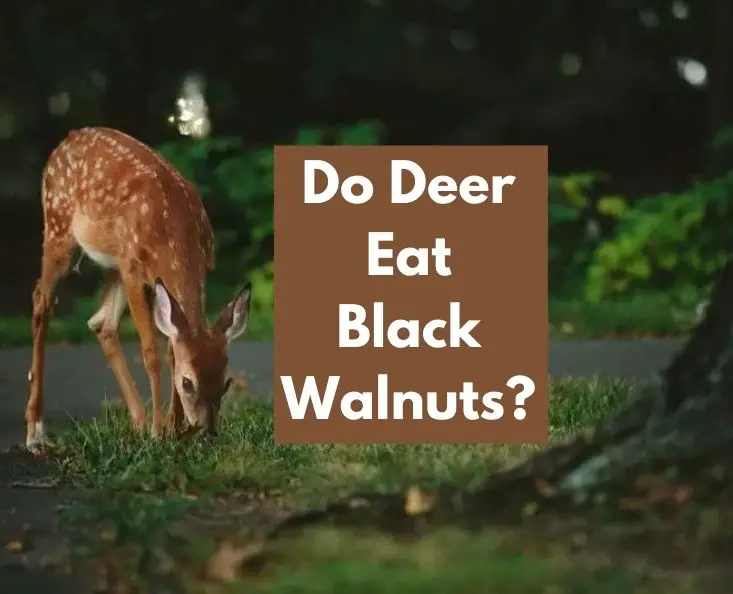There are a lot of myths out there about what deer do and do not eat. One common question is: do deer eat black walnuts?
Deer do not often eat black walnuts because of their hard shells, but but will eat them if they need to for survival. While black walnuts are not a common part of a deer’s diet, they provide vitamins and protein which aid in deer health.
There’s a bit more to learn about deer eating black walnuts which we’ll cover in today’s guide. Read on for more info.
Why Don’t Deer Eat Black Walnuts?
As we covered, deer will not eat black walnuts as their first choice, but will do it if there are no other easy sources of food around.
Why is this?
Well, for one, black walnuts have a hard shell that can be tough for deer to crack, so deer are more likely to eat the buds or stems on a walnut tree rather than the nuts.
The same goes for walnut sprouts from stumps and their seedlings.
During winter months, deer may eat the twigs, bark, and leaves off of black walnut trees, but not the walnuts themselves.
Additionally, deer will consume a wide variety of foods like black walnuts based on opportunity.
Black walnuts fall on the ground and are easy to get to, so deer will eat them as a last resort if it’s a matter of survival.
If you’re not convinced, leave some black walnuts out for deer to eat (or plant a black walnut tree), and wait to see what happens!
Do Deer Like Black Walnuts?
Deer are not particularly fond of black walnuts, but will eat them for survival.
This is usually because it’s a matter of life and death and other food resources are scarce around fall and winter.
This is because black walnuts have a hard shell that can be challenging for deer to crack.
A deer’s jaw and teeth are not designed to break thick shells like the ones found on black walnuts.
We wouldn’t suggest specifically growing black walnut trees to attract deer, but if you already have them they won’t be a deterrent.
Are Black Walnuts Good For Deer?

In the rare occasion that a deer chooses to eat black walnuts, it provides them with a high amount of protein along with the following vitamins and minerals:
- Vitamin E
- Folate
- Potassium
- Magnesium
These vitamins and minerals provide deer with many benefits.
Vitamin E helps to support deer immune function and the integrity of the membranes in deer cells.
Potassium is great for deer because it helps maintain good pH balance and aid in proper digestion.
Magnesium is great for antler growth, increasing body weight, and has immune system benefits for deer.
Fat-Soluble Vitamins For Deer
Vitamins A, D, E, K, and calcium are fat-soluble, so they can be stored in the deer’s fat and liver to be used later as needed.
This means that vitamin A content from deer eating black walnuts can be “stored up” for later use, which is highly beneficial.
Water-Soluble Vitamins For Deer
Vitamin C, B Vitamins, niacin, folic acid, and potassium are all water-soluble, which means they cannot be stored, so they must be replaced continually.
So a deer that eats black walnuts for the potassium content must continue to consume foods that contain these necessary vitamins to stay healthy.
How To Feed Deer Black Walnuts

There are a few things to keep in mind when feeding deer black walnuts: the size of the portion, your scent, and how many deer you’re feeding.
Make sure to place the black walnuts on the ground where they’re visible and can be easily reached by deer.
If you’ve got a hickory tree, the nuts will naturally fall on the ground and the deer will eat them, usually after all other food resources have been depleted.
If deer are not normally around your area in winter, don’t feed them leading up to winter as they will not migrate where and when they should.
This will lead to the deer relying on you as their food source and can result in starvation.
Should I Shell Black Walnuts For Deer To Eat?
Chances are that it’s not worth it for you to spend time specifically shelling black walnuts for deer.
You could leave your scent on them, plus the deer’s teeth are designed to be able to eat food (or crack shells open) for food that’s best for them.
Considering that deer jaws and teeth are not designed to open black walnuts, you’re best leaving things alone.
Don’t Leave Your Scent On Deer Food
Deer have a keen sense of smell that allows them to smell human scent farther than bloodhounds can, and can smell up to six different scents at once.
Deer won’t eat food set out for them if it has a strong human scent on it, so you should take care to minimize your trace.
You can do this by rinsing the black walnuts and also washing your hands with antimicrobial soap.
Alternatively, you can put a few drops of apple cider vinegar on your hands when handling food you’ll be giving to the deer.
Another easy option is to use gloves when handling food for deer to eat.
Consider The Amount Of Deer You’re Feeding
If you have lots of deer in your area, think twice about putting out food continuously for them.
If you bring deer together at the same feeding site, it can increase their risk of contracting chronic wasting disease or other communicable diseases from each other.
Can Deer Eat Black Walnuts? Wrapping Things Up
So, do deer eat black walnuts?
The answer is no.
Deer will rarely eat black walnuts if they’re available because of their tough shells, although they can actually benefit from the vitamins and minerals found in them.
You’ll typically only ever see a deer eating black walnuts after the shells have softened and if it’s a matter of survival for the deer.
Have any observations to add to the discussion? Be sure to let us know in the comments below.
Check our our other helpful wildlife guides while you’re here:

